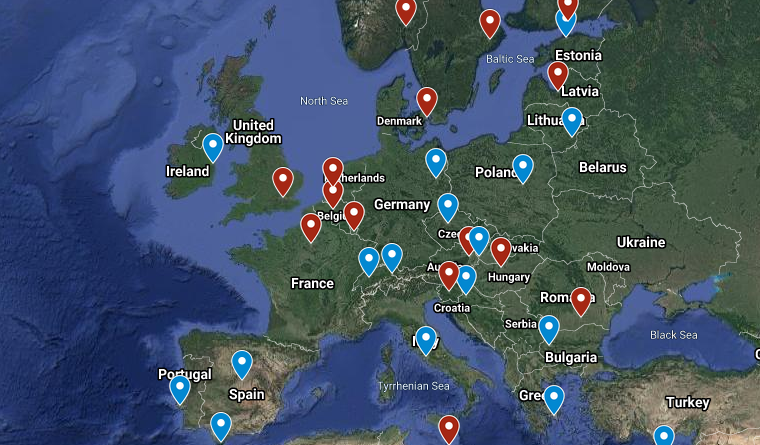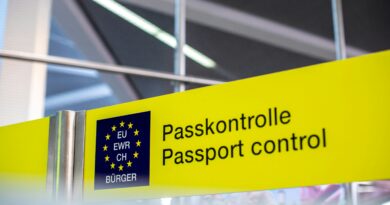Interactive map: how to secure residence rights under the EU-UK withdrawal agreement (in 32 countries)
Free movement of people between the UK and 31 European countries ended on January 1 2021, following the UK exit from the European Union.
Many of the rights of EU citizens living in Britain and British citizens living in the EU before December 31 2020 are protected under the withdrawal agreement. Similar deals cover non-EU countries that are part of the EU free movement area, Norway, Iceland, Liechtenstein, and Switzerland.
All people concerned, and their family members, however, have to complete an administrative procedure to secure their new status. For several countries there are few months left to do so.
The agreements offer two options to handle this process. The first requires people to apply and prove they meet the requirements to stay. The second requires to simply register or exchange the old residence document with a new one.
The UK (excluding Gibraltar), 13 EU countries, and Norway have opted for the application procedure (these are marked in red in the map below). The other countries (marked in blue) have chosen the registration procedure.
In Ireland UK citizens do not need a residence document, but those who wish to evidence their rights under the withdrawal agreement can request one.
This interactive map shows how the post-Brexit residency schemes work in each country, including costs and where to find help. The countries that require to apply for the new residence status are marked in red, those that require to register or swap documents in blue. The information in the map is based on the second report of the joint committee overseeing the implementation of the agreement on citizens’ rights, and other public sources. The information is valid at the time of publication and does not constitute advice or guidance.
It is estimated that almost 4.5 million people (up to 4.1 million EU citizens in the UK and more than 300,000 Britons in the EU, with their family members) have been required to apply to continue living in their host state, regardless of whether they had already acquired permanent residence rights.
But there is uncertainty around the number of people affected, especially in the UK and France, where EU citizens were not requested to register before Brexit. In other countries, including tourist hotspots such as Spain, Portugal or Italy, several people were used to come and go without moving their official residence. With Brexit, they had to decide where to stay.
The UK was the first country to launch the new residence system, on 30 March 2019, after a 6-month live trial. Most other countries have launched their schemes between the summer of 2020 and the beginning of 2021. The Czech Republic should start issuing the new biometric cards in August 2021, and Iceland is yet to announce its new system.
Applicants have to prove they were living in the host country by December 31 2020 to benefit from the withdrawal agreement. This can typically be done showing a residence card, or with documents such as an employment contract, university statement, bills, bank statements, proof of being self-employed or being self-sufficient and having comprehensive sickness insurance (CSI). The CSI requirement has been lifted in the UK.
Most people will be able to obtain their new residence status without any problem. For others, including spouses, dependants, children or vulnerable citizens, proving their right to stay may be more difficult. On top of it, it is all happening during a pandemic.
Under the withdrawal agreement, eligible citizens have until June 30 2021 to apply for the new status. The Netherlands, Luxembourg and France have extended the original deadline to September 30 or December 31 (Luxembourg). Other countries already planned more time. In Finland and Sweden the deadline was set on September 30. In Austria, Belgium, Denmark, Hungary, Poland, Romania and Slovenia, it is December 31 2021.
Cyprus, Estonia, Italy, Spain and Switzerland have not set an end date. Ireland and Lithuania have deadlines only for non-EU family members.
In some countries, including the UK, people who do not apply by the deadline can become unlawfully resident and risk deportation.
In Bulgaria and Germany, not applying on time will not have an impact on the acquired rights, but in Bulgaria it may lead to a fine and in Germany to difficulties when accessing benefits or crossing the border.
Under the withdrawal agreement, it should be possible to apply late if there are good reasons for the delay.
All EU countries will provide British citizens with a uniform residence card stating that they are beneficiaries of the withdrawal agreement.
For countries such as Estonia, Lithuania and Poland the card is requested to prove residence rights when crossing the border. Governments recommend to get the new residence status before travelling abroad to avoid problems at passport control, as Britons travelling to the EU from January 1 2021 will have the passport stamped and may need a visa, unless they are beneficiaries of the withdrawal agreement.
EU citizens in the UK are the only group that won’t receive a physical document to prove their legal position. Their ‘settled status’ can only be viewed online.
In line with EU rules, individuals who have continuously lived in a country for more than 5 years acquire the right to permanent residence. Under the withdrawal agreement, those with less than 5 years of residence can stay and build the remaining time. This is usually reflected in the type of documents issued by EU member states.
However, Hungary and Malta plan to grant permanent residence to UK citizens regardless of the previous length of stay.
In the UK, EU citizens with at least 5 years of residence will be granted settled status and the right to stay permanently. Those with less than 5 years will receive pre-settled status with an option to re-apply as ‘settled’ after reaching the 5-year requirement.
In 13 countries, including the UK, the procedure is free, while elsewhere Britons have to pay a fee. This is similar to the cost of national IDs and ranges between the equivalent of 10 euros in Croatia to 61.50 euros in Austria. Some countries reduce the fee for children, pensioners or people in need, or exchange residence documents for free to UK citizens who already had permanent residence.
Family members from non-EU countries may be required to go through a more complex procedure. There are also specific rules for frontier workers, who live in a country and work in another.

Which rights are protected
The beneficiaries of the withdrawal agreement can continue to live in their country of residence and exercise the following rights:
- Study, work and set up business under the same conditions of nationals
- Equal treatment and prohibition of any discrimination on grounds of nationality
- Recognition of professional qualifications acquired before 31 December 2020
- Social security benefits, e.g. healthcare, pensions and children allowances, and their exportability
- Social security coordination, e.g. aggregation of pension contributions in different EU countries
- Family reunion, as long as the relationship existed before 31 December 2020
- Return after an absence of up to 5 years
- Access to public healthcare during short stays in EU countries, or in the UK, based on the European Health Insurance Card
- Reliance on the European Court of Justice for at least 8 years for the interpretation of related laws.
Both EU nationals living in the UK and Britons living in the EU also lose some rights. Britons in the EU lose:
- The right to work, study and set up business in EU countries where they do not reside (free movement rights)
- The recognition of professional qualifications beyond their host country or the country where they work
- The right to return to the UK with non-UK spouses under the more favourable EU regime, after 2022
- The right to provide cross-border services in the EU as self-employed
- The right to vote in the European parliament elections and in municipal elections in the country of residence, unless the host state allows the vote of non-EU residents or there is an agreement with the UK
- The right to submit European Citizens Initiatives, which are mass petitions with the request the European Commission to legislate on a certain matter.
In some countries British citizens will be subject to less favourable rules on citizenship. For example, Germany allows dual nationality only to citizens of other EU member states.
EU citizens in the UK lose:
- The automatic right to return, after an absence of more than 5 years
- The automatic right to family reunion for relationships started after January 1 2020
- The right to return to the home country with non-EU family members, including UK citizens, under EU law
- The recognition in the EU of professional qualifications acquired in the UK after January 1 2021.
EU nationals provisionally maintain the right to vote in UK local elections and the British government is seeking to negotiate bilateral voting rights agreements with EU states.
In case of problems…
In case of difficulties, citizens can complain with the relevant authorities or appeal to revert unfavourable decisions. British in Europe have an explainer here.
The implementation of the citizens’ rights chapter of the withdrawal agreement will be monitored by the European Commission for the 27 EU countries, by the Independent Monitoring Authority in the UK, and by the EFTA Surveillance Authority (ESA) for Iceland, Liechtenstein and Norway.
These bodies will receive complaints, address systemic issues and provide a report to the specialised committees on citizens’ rights that oversee the deals.
Claudia Delpero © all rights reserved
Map and infographic by Renata Petani © Europe Street News
Europe Street News is an online magazine covering citizens’ rights in the EU and the UK. We are fully independent and we are committed to providing factual, accurate and reliable information. We believe citizens’ rights are at the core of democracy and information about these topics should be accessible to all. This is why our website and newsletter are available for free. A lot of research work is behind every article, so if you found this useful, please consider making a contribution so we can continue and expand our coverage.




